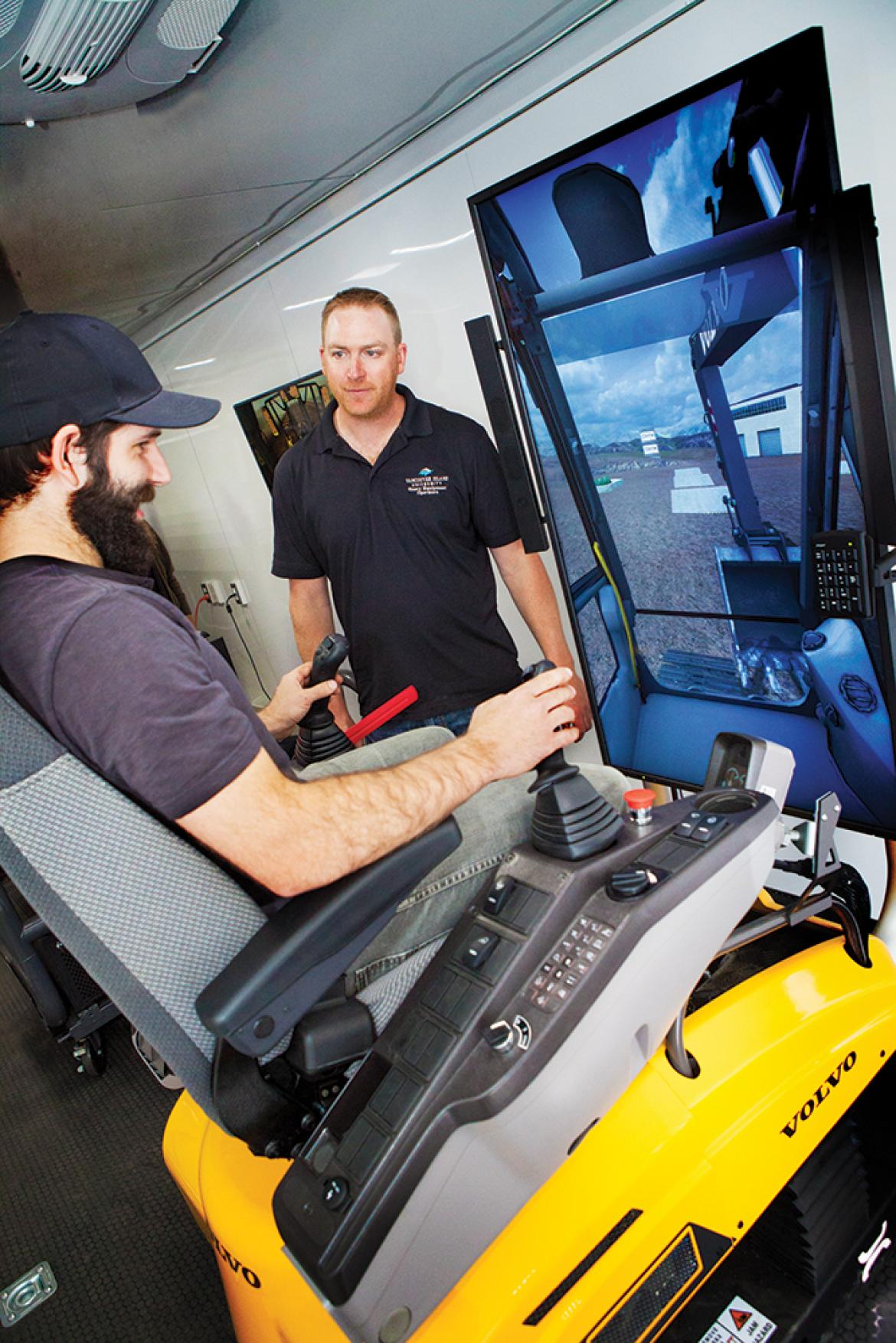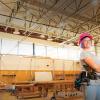
January 4, 2017 - 10:45am
Vancouver Island University’s new mobile simulator units are changing the way education is delivered in its Heavy Equipment Operator Foundation program.
By Jenn McGarrigle
For most students, playing video games during class leads to lower marks, but for students using VIU’s heavy equipment simulators, becoming a master of the joystick can lead to career success.
Last year, the University received $1 million from the federal government’s Western Economic Diversification Program to purchase eight heavy equipment/forestry simulators, as well as two truck-and-trailer units to transport them wherever they are needed, expanding access to training.
“The whole purpose of the simulators is to be innovative in our training,” says Paul Mottershead, Associate Dean of Trades and Applied Technology. “It allows us to reach out into remote communities, particularly First Nations communities that would not normally have any access to university or college. We also want to work with our industry partners to take the training to them. It’s really about creating opportunities for young people to enter the forestry and heavy equipment operation sectors.”
WHAT THEY DO
The simulators replicate the interiors of different pieces of forestry and heavy equipment machinery, including a grader, dozer, excavator, wheel loader and rock truck, and forestry-specific machinery such as a feller-buncher, heel-boom log loader and dangle-head forestry processor.
Students stepping into the simulator seats will find the controls exactly as they are on the real machines. The large screens project 360-degree views of customizable, virtual landscapes, and the seats are on sophisticated motion platforms that move the operators around as they drive over rough terrain or pick up heavy objects. For example, on the excavator simulator, if a student drops the bucket too hard on the ground, the machine lifts just the way it would in a real machine.
“On simulators, you can practice cutting that same tree or digging that same ditch over and over without serious consequences until you get it perfect and are comfortable before going on a real machine,” says Marc Schaufelbuhl, a graduate of VIU’s Heavy Equipment Operator (HEO) program. “There is no substitute for running a real machine, but simulators are as close as you can get.
Kevin Levins, an Instructor in VIU’s HEO program, says the companies have done an incredible job of mimicking the real machines.
“I had previously considered the value of simulators for training operators somewhat limited, when compared to the actual machines and the complexity of running and operating real ones,” he says. “I was pleasantly surprised with the realistic feel of the motion platforms and how well they replicate operating a piece of heavy equipment.”
Instructors can design the learning environment to replicate real sites students may be visiting during their training. The machines even help instructors prepare student reports – providing information on each student’s progress. This is an important aspect, as an instructor supervising five students on real machines would be unable to note everything students did incorrectly, says Instructor Brandon Lindsay.
“It gives us the chance to stand beside the student and have a proper conversation while they are operating, which is difficult to do on the real machines,” he says.
Industry is also interested in the potential of VIU’s new simulators. John Prachnau, owner of Nanoose based Antler Creek Logging, sees the simulators as a good way to screen potential trainees for aptitude and save companies money in machine repair and training costs. “They are a great way for trainees to get familiar with the controls before jumping into a real machine, which should greatly reduce machine damage,” he says. “The simulators should also reduce the time that an operator has to spend in the cab with the trainee, which will in turn reduce training costs.”
Another benefit of the simulators is they can be taken into remote communities to provide training to students who might be unable to come to VIU campuses for training. James Redford, Director of Lands and Resources for Quatsino First Nation, which has two forestry-related business operations, including Quatern, a limited partnership with Western Forest Products, says there is interest among members of the small community to gain technical skills and certification. “The mobile training labs will provide a level of access to training that was previously unavailable to the community,” he says. “The training in turn will open up job opportunities for our community members.”
SIDEBAR: THE FUTURE OF HEAVY EQUIPMENT OPERATING
The Truck Loggers Association anticipates 4,700 job openings between now and 2022 in BC’s coastal forestry industry – about half of the current workforce – due mainly to retirements. VIU hopes to help fill this need by taking the training to forestry companies and remote communities such as Quatsino First Nation. Students would learn theory for four weeks and then spend a week practicing on the simulators. The simulators can also be brought into public schools to get students excited about careers in the heavy equipment/forestry industries.
*This article originally appeared in the Fall/Winter 2016 issue of VIU Magazine. Check out more stories from the latest issue of VIU Magazine here.
Tags: VIU Magazine






